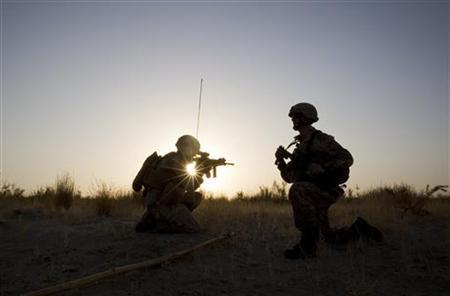Mental Problems Of Soldiers’ Kids Tied To Wars, 4 July 2011, Reuters.com
By Alina Selyukh

U.S. Marines of Weapons Company, 1st Battalion, 3rd Marines are silhouetted against the sunset during a joint patrol with Afghan National Army (ANA) soldiers along Helmand river near the Camp Gorgak in Helmand province, southern Afghanistan, July 3, 2011. Credit: Reuters/Shamil Zhumatov
WASHINGTON — The longer U.S. soldiers were deployed in Iraq or Afghanistan, the more likely their children would be diagnosed with mental health problems, according to a study published Monday.
The study, published in the Archives of Pediatrics and Adolescent Medicine, analyzed medical records of 307,520 children of active-duty Army personnel, aged 5 to 17 years old. It found almost 17 percent of them exhibited mental health problems.
“Children of parents who spent more time deployed between 2003 and 2006 fared worse than children whose parents were deployed for a shorter duration,” the study’s researchers wrote.
The lead researcher was Alyssa Mansfield, who was at the University of North Carolina at Chapel Hill at the time the study was conducted.
The U.S. Army reported some 562,000 members in active duty and more than 570,000 children of such members in 2010. Just under two-thirds of all active-duty servicemen and women were married and 15 percent were raising children as single parents.
FULL ARTICLE AT: http://www.reuters.com/article/2011/07/04/us-military-idUSTRE7634XD20110704






